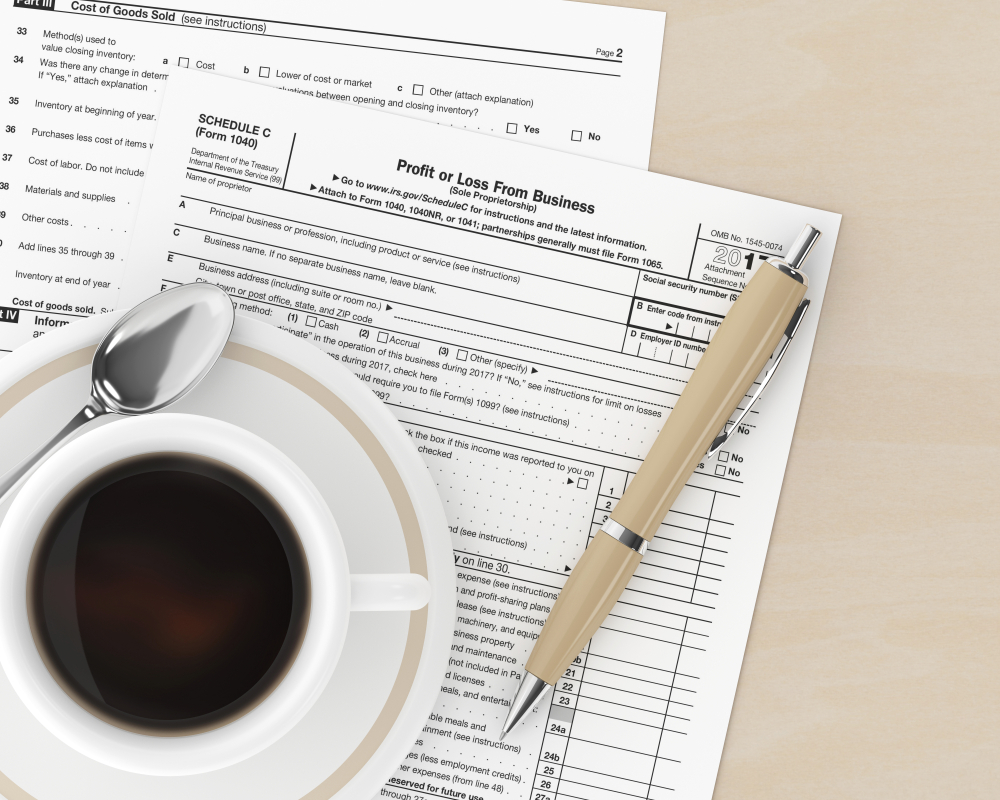Schedule C, Profit or Loss from Business: What is it and Who Files One?
5 min read
January 17, 2025 • Block Advisors
If you run a business, you’ll likely file a Schedule C form (Form 1040) to report your business income this tax year. Learn about the 1040 Schedule C tax form – sometimes abbreviated to Sch C – for small business owners here. Among all tax forms for small businesses, self-employed business owners are often familiar with this – and for good reason. The IRS Schedule C is the default IRS form for sole proprietors, single-member LLCs, and qualified joint ventures.
What is IRS Schedule C?
Schedule C: Profit or Loss from Business reports to the Internal Revenue Service (IRS) how much income you made or lost in a business.

This IRS form reports:
- Taxable business income
- Whether your business has a profit loss or gain
The 1040 Schedule C form is part of your personal tax return— you’ll generally file your Schedule C alongside your IRS Form 1040.
Long story short, the profit or loss you make on your business activity flows through (is reported) in your personal income tax return. Sch C is the go-to tax form to help you make those calculations.
Who files a Schedule C tax form?
If you’re wondering who files a Schedule C Tax Form, the answer is not everyone. It all depends on your business structure. So, you’ll file this tax form if you own a business and it’s a:
- Sole proprietorship (Not registered as an LLC or corporation—this is the default if you haven’t incorporated your business)
- Single member LLC (If you don’t elect to file as a regular corporation or an S corporation)
- Qualified joint venture (If you opt not to file partnership forms, spouses can file two Schedule C forms)
Get expert help for your small business taxes
Millions of small business owners trust Block Advisors
Who doesn’t file the IRS Schedule C?
Employees or business entities not listed above will not use IRS Schedule C. Neither will hobbyists (someone not looking to profit from their hobby). If you work as a traditional employee and not a self-employed individual, you should receive a W-2 form and report the income on your 1040 form.
Business entities such as S corps and partnerships use different IRS forms, like Form 1065 (partnerships). We’ve got your back if you’re looking for more on this topic. Block Advisors has business formation products and services to equip you with information to help you navigate the entity registration process.
Schedule C instructions
For those who need to file the 1040 Schedule C, have the information below handy. If certain sections/lines don’t apply to your business, you can skip them (for example, if you don’t carry inventory, you won’t need inventory records or to complete Part 3).
Info you need to file your Sch C:
- Your name and your business name
- Accounting method (Cash, accrual, or other)
- Address
- Business expenses, like advertising costs, mileage, and other self-employed tax deductions
- Cost of goods sold
- Employer Identification Number (EIN)
- Social Security number
- Gross receipts or sales
- Inventory records
- Product or service activity
To summarize, the top of the Schedule C tax form collects important information about your business.
Parts of the Schedule C tax form:
Part 1: In this section, you’ll determine your gross income through line items like gross receipts or sales, returns and allowances, cost of goods sold, and other income calculations. (See: What is an Income Statement?)
Part 2: Here, you’ll report your business expenses (as applicable) and calculate your total business expenses before business use of your home. In this section, you share your business deductions. The last few lines in Part 2 help you determine your total expenses, expenses for business use of home, tentative profit or loss, and net profit or loss.
Part 3: This area helps you determine your cost of goods sold.
Part 4: This part includes a section where you can report certain information on vehicle use for your business. You don’t need to report any vehicle information if you don’t use a vehicle in your business.
Part 5: The final section lists business expenses that don’t fit within Part 2. This includes cell phone and internet deductions, bank charges, and other miscellaneous deductions.
Once you complete your Schedule C tax form filings, you’ll want to report your net profit or loss on your personal tax return on Form 1040. This line also helps you determine your overall taxable amount to calculate self-employment taxes on Schedule SE.
Schedule C vs. Schedule C-EZ
For any tax year before 2019, if you were a sole proprietor and didn’t report more than $5,000 in business expenses and reported a net profit (among other qualifications), you had a different option for filing. Previously, if your business met the requirements, you could use a simpler version of Schedule C called Schedule C-EZ. This form was less detailed than the current Schedule C, but it is no longer available beginning with the 2019 tax year.
Get help filing IRS forms and Sch C
Small business tax forms, like the IRS Schedule C, are critical to determining your business’s taxable income or losses. If filing your Schedule C form has you stressed, or if you simply don’t have time, Block Advisors is here to help you with your tax preparation. Our small business-certified tax pros and guarantees will put your mind at ease and get you back to what’s most important: making sure your small business thrives!
This article is for informational purposes only. The content may not constitute the most up-to-date information and should not be construed as legal advice.




